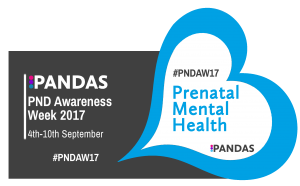8th September 2017

A blog written by Gill Martin, Specialist Health Visitor for Perinatal and Infant Mental Health at St George’s NHS Foundation Trust and iHV Perinatal Mental Health Champion, in support of PANDAS Foundation’s second Pre and Postnatal Depression Awareness Week #PNDAW17 – 4 to 10th September 2017.

Gill Martin, Specialist Health Visitor for Perinatal and Infant Mental Health at St George’s NHS Foundation Trust and iHV Perinatal Mental Health Champion
The antenatal visit offered by health visitors from 28 weeks allows early assessment of women and families regarding perinatal ill-health and risk.
Antenatal depression and anxiety is a strong predictor for postnatal mental ill-health if not recognised and treated, with up to 1:5 women developing mental health problems during pregnancy and in the first year after birth. By supporting women affected by antenatal mental ill-health and raising awareness of the signs at the earliest opportunity, it enables an early relationship between the parent and health professional, and timely referral and care.
My role as a Specialist Health Visitor in Perinatal and Infant Mental Health and iHV Champion includes training of Health Visiting teams in current policy, research and the health visitor role in perinatal mental health. In group work, we discuss how, through the antenatal contact, pregnant women and their partners can be made aware of the signs of emerging mental health difficulties and are given information on self-help and how to obtain further support. The health visitor can promote the importance of prenatal parental bonding and sensitivity.
In addition to referrals to statutory partner agencies supporting antenatal mental ill-health, health visitors can signpost to voluntary agencies such as Home Start and Family Action.
Access to perinatal and mental health charities via websites, email and telephone support enables sufferers to gain support without leaving home and also during out of office hours. Peer support groups for face-to-face contact are available in regions throughout the country.
Research shows us the value of peer support in mental health in reducing isolation, validation of similar experiences and reducing stigma. Finding others who have experienced similar distress is a valuable part of the journey to recovery.
Role of the Health visitor in antenatal mental health
- To have attended regular perinatal mental health training from their Trust.
- To work with partner agencies following referrals of women with known risks.
- To offer an antenatal visit to women from 28 weeks of pregnancy.
- To sensitively assess women and families for mental ill-health (using Trust’s validated tools and general discussion) and other risk factors such as domestic violence, drug and alcohol abuse. To follow local safeguarding policy.
- To promote awareness of the mental health issues common in pregnancy and the postnatal period and what to do if these occur.
- To be aware of and refer to local perinatal services.
- To signpost to voluntary agencies.
- To give self-help advice.
Pandas Foundation: http://www.pandasfoundation.org.uk/
MABIM – Leaders masterclass series 3 top tips: https://maternalmentalhealthalliance.org/projects/mumsandbabiesinmind/mabim-tools/
Gill Martin, Specialist Health Visitor for Perinatal and Infant Mental Health at St George’s NHS Foundation Trust and iHV Perinatal Mental Health Champion

